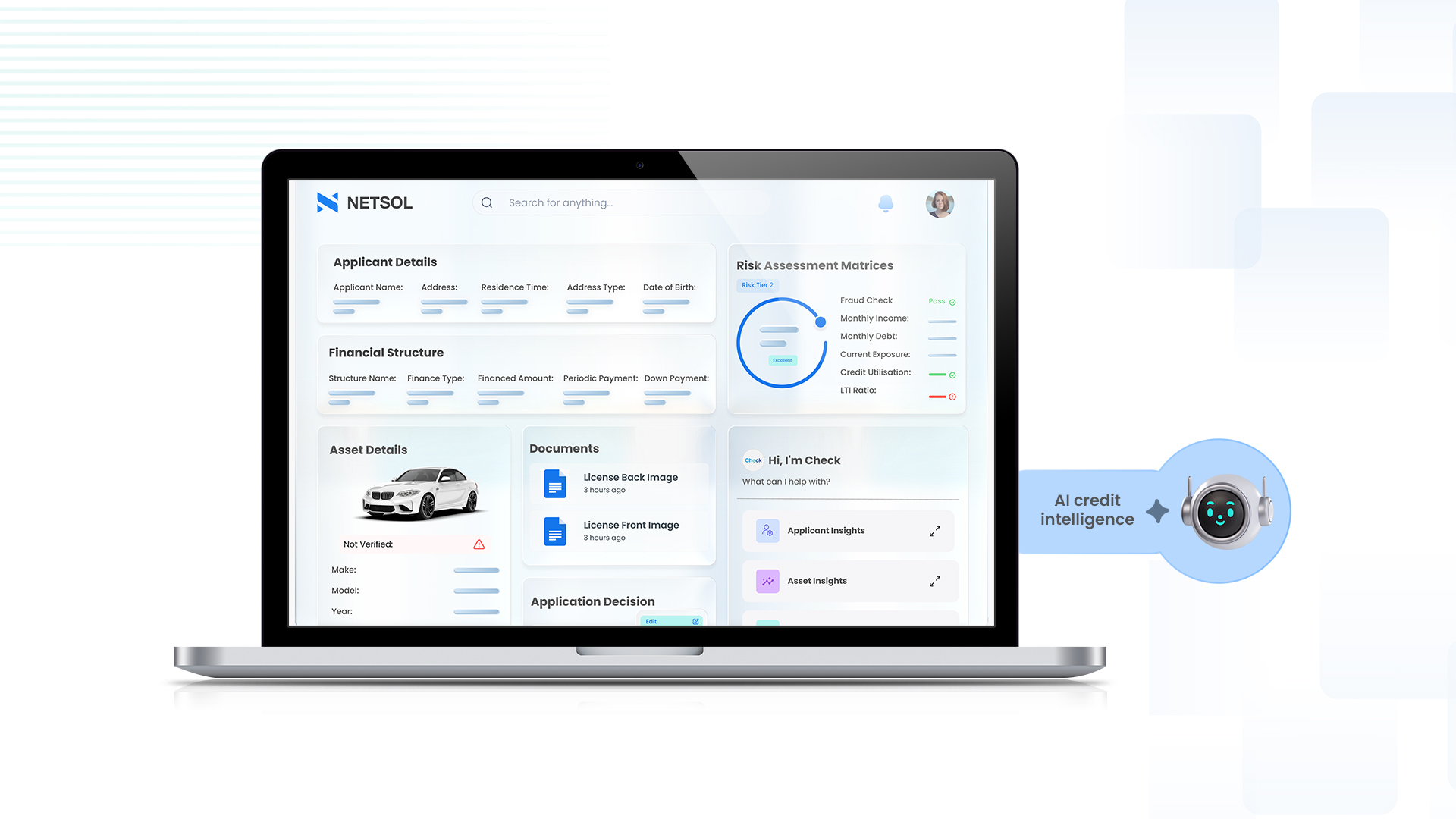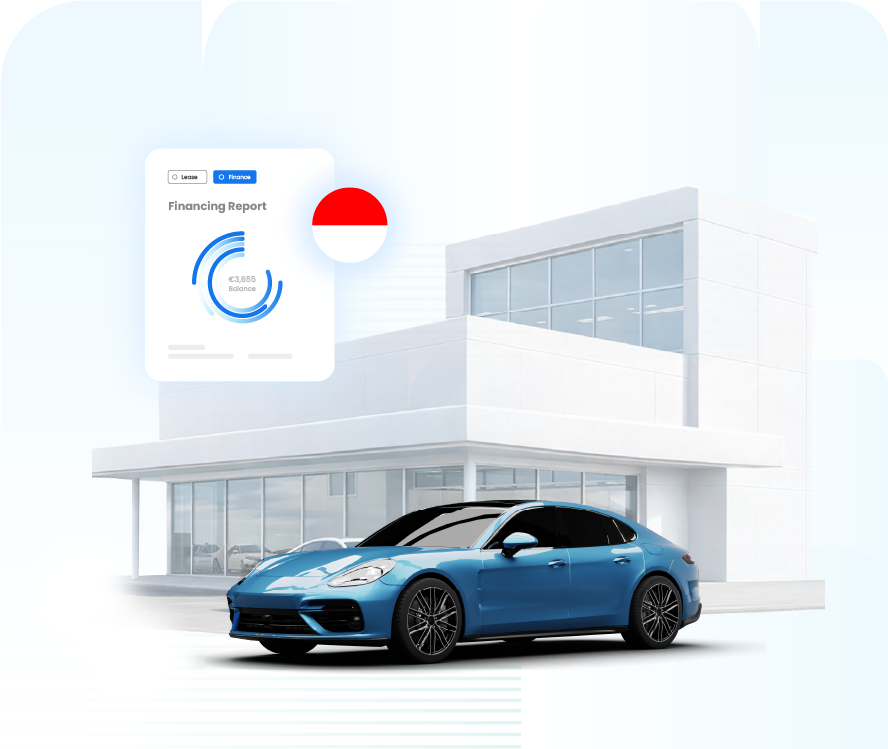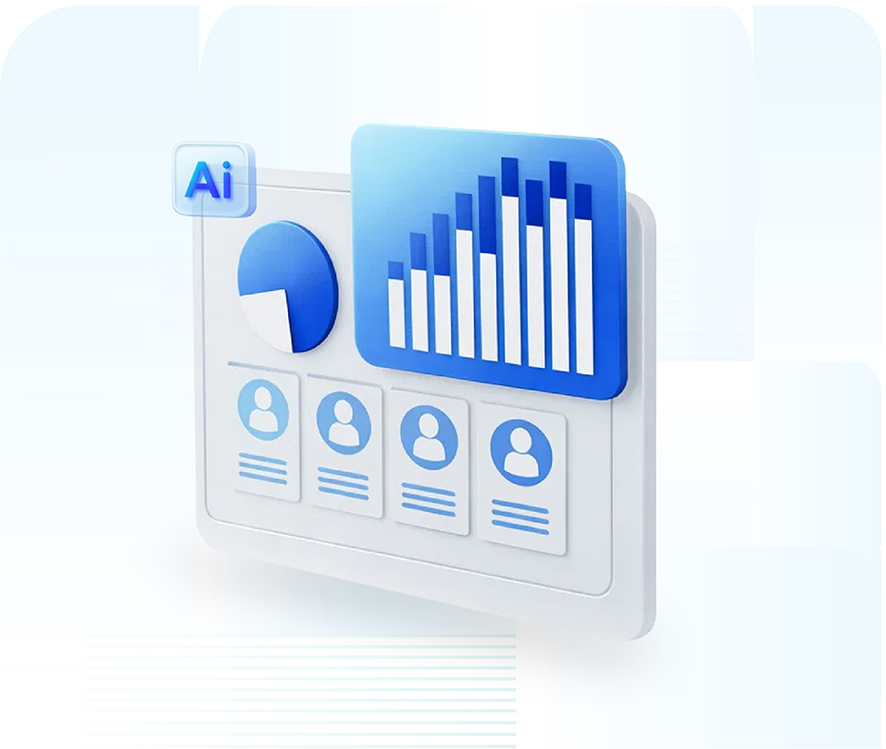Blog
Innovative insights into auto finance: An overview of six trends shaping the industry
By NETSOL Technologies , on September 5, 2023
NETSOL's Innovation Lab continues to advance cutting-edge technologies that are gaining traction in the auto finance and leasing industry, driving future growth.

This write-up delves into six of the most recent trends and advancements identified by NETSOL that are revolutionizing the auto finance industry.
Auto finance technology and digitization: The future is now
The surge in favor of auto finance software and auto finance technology platforms stems from their ability to provide a smooth and swift method for obtaining car loans. The auto finance industry is being transformed by financial technology companies that are introducing inventive products and services, consequently streamlining the lending process and rendering it more consumer and user-centric. Additionally, these platforms enhance transparency and foster improved interaction between lenders and borrowers throughout the loan journey. The collaboration between traditional lenders and fintech enterprises will play an essential role in delivering groundbreaking offerings that cater to the evolving requirements and preferences of customers.
The auto finance industry is being transformed by financial technology companies that are introducing inventive products and services, consequently streamlining the lending process and rendering it more consumer and user-centric.
The utilization of auto finance software simplifies the application and approval procedure, enabling borrowers to apply for loans, receive approvals and completely manage all their payments entirely online. This greatly increases convenience, enables rapid decision-making and greater transparency. Lenders enjoy advantages such as lowered operational expenses, enhanced risk evaluation, faster processing and response times, and the opportunity to reach a wider array of customers. Conventional lending companies and financial institutions must adapt to digitization in order to remain competitive in today's highly dynamic environment.
Lenders enjoy advantages such as lowered operational expenses, enhanced risk evaluation, faster processing and response times, and the opportunity to reach a wider array of customers.
This entails investing in technology, automating processes and providing swift and streamlined services to customers. Lenders should upgrade their loan origination systems to support rapid, automated decisions as well as their contract management systems in order to seamlessly manage detailed credit contracts throughout their lifecycle.
Due to insights gained from the economic slowdown brought about by the pandemic, lenders have been further embracing automated technology to enhance their efficiencies, all the while taking into account emerging automotive industry trends and those pertaining to vehicle ownership.
52%of auto loan originations were attributed to digital channels in 2022, according to TransUnion.
TransUnion, an American consumer credit reporting agency, reported that 52% of auto loan originations were attributed to digital channels in 2022, signifying a notable transition towards online lending platforms. The same study demonstrated that individuals who sought auto loans through online applications encountered a 21% reduction in decision time compared to conventional application routes. Auto finance and digitization in the industry offer speed and convenience that cannot be surpassed.
Data-driven lending decisions
Auto lenders are utilizing customer data strategically to customize loan propositions, interest rates and repayment conditions for each borrower. These personalized loan choices heighten customer contentment by presenting offers that align with their distinct requirements and financial circumstances, culminating in elevated customer loyalty.
Lenders are increasingly relying on unconventional data sources to evaluate creditworthiness, enhancing their ability to serve customers with limited credit histories more efficiently. As an array of data becomes accessible through diverse channels, lenders are harnessing big data and analytics to arrive at more informed lending choices, thereby substantially reducing risk and diminishing default rates.
Lenders are increasingly relying on unconventional data sources to evaluate creditworthiness, enhancing their ability to serve customers with limited credit histories more efficiently.
Through the utilization of intelligent automation and a diverse array of data sources, approvals for deals can be expedited, catering to a broader spectrum of borrowers with reduced risk. This empowers lenders to operate on the basis of swiftness while concurrently enhancing the loan's sustainability. However, it is imperative that lenders navigate through privacy regulations while guaranteeing the safeguarding of customer data. This involves transparent communication about data utilization and adherence to compliance standards.
When it comes to loan origination, lenders should seek an origination solution that leverages artificial intelligence to produce data analytics, thereby expediting the auto-decisioning process. By tapping into alternate data points like utilities, rent and additional credit histories, a floorplan finance software can more effectively assess an applicant's existing financial standing and the variables that could influence their loan repayment capability. This application of data analytics has demonstrated its capacity to heighten precision during the credit application process.
Harnessing AI and ML for advanced loan underwriting and risk appraisal
The integration of artificial intelligence is reshaping the auto finance sector by enhancing credit scoring and risk evaluation, automating procedures and elevating the overall customer experience. Artificial intelligence and machine learning are poised to maintain a substantial influence in shaping the future landscape of auto lending.
The integration of AI is reshaping the auto finance sector by enhancing credit scoring and risk evaluation, automating procedures and elevating the overall customer experience.
Auto lenders are progressively utilizing AI and ML algorithms embedded in auto loan software which essentially empower lenders to scrutinize extensive data volumes, culminating in more precise credit evaluations and expedited processing periods.
Incorporating Generative AI solutions and machine learning into lending processes can yield several advantages for lenders. These technologies empower lenders to predict potential delinquencies, detect misrepresentation or fraud within loan applications, assess creditworthiness using both conventional and alternative credit data sources and accurately calculate collateral value.
Furthermore, AI and ML facilitate the evaluation of used vehicles based on historical data, pinpoint the ideal audience for specific loan types, and help lenders track approval rates and capture ratios in alignment with key performance objectives. These technologies also enable lenders to identify latent operational obstacles through surveys and forecast customer behaviors, enabling tailored vehicle recommendations.
Additionally, by utilizing predictive analytics, dealerships can enhance their ability to precisely target customers, providing tailored financing choices aligned with unique credit profiles. Further, auto finance companies are adopting AI-powered voice assistants and chatbots to elevate the customer experience. These tools swiftly and accurately address frequently asked questions, enabling resources to be allocated towards more intricate tasks.
By utilizing predictive analytics, dealerships can enhance their ability to precisely target customers, providing tailored financing choices aligned with unique credit profiles.
Maintaining ethical standards while employing AI and ML in lending mandates transparent decision-making protocols, the mitigation of bias and safeguarding customer data privacy. It is imperative for lenders to find an equilibrium between the advantages of automation and the necessity for human intervention.
Subscription-based models as an alternative to traditional ownership
The rise of subscription-based car financing models is evident, enabling people to access vehicles through a subscription-based approach, reducing or even eliminating the need for purchasing, and subsequently, long-term ownership commitments. This model integrates ownership, insurance, maintenance and financing into a unified monthly payment. Presenting a convenient alternative to conventional ownership and leasing alternatives, these services could serve as a means for automakers and lenders to engage a demographic of younger customers as well as those that have a preference towards not purchasing their own vehicles.
Subscription-based models provide versatility, encompassing the capacity to transition between various vehicle models and avail supplementary services like maintenance and insurance. Auto manufacturers and dealerships must modify their business models to align with subscription-based models, potentially resulting in fresh revenue avenues and improved customer relationships.
Auto manufacturers and dealerships must modify their business models to align with subscription-based models, potentially resulting in fresh revenue avenues and improved customer relationships.
Platforms and services pertaining to ride-sharing enable vehicle owners to offer transportation to individuals who do not possess their own vehicles. It is essential for auto finance companies to offer diverse loan options tailored to customers engaged in ridesharing, given the heightened frequency of vehicle use and the associated elevated accident risks. While commercial vehicle loans partially cater to the needs of these borrowers, future lending trends might involve the emergence of specialized rideshare-focused loan products.
Eco-friendly auto financing for a sustainable future
According to the International Energy Agency, a Paris-based autonomous intergovernmental organization, the electric car market has been witnessing exponential growth as sales surpassed the 10 million mark in 2022.
The popularity of electric and hybrid vehicles is increasing, leading EV manufacturers to provide increasingly appealing financing choices including specialized financing plans and incentives to buyers. This pattern is set to expand further, driven by a growing number of environmentally conscious consumers and governmental incentives supporting green vehicle ownership.
14.5M+units is the anticipated figure for EV sales by the end of this year (2023), according to Rystad Energy.
EV sales are anticipated to reach over 14.5 million units by the end of this year (2023), according to Rystad Energy, an independent energy research and business intelligence company headquartered in Oslo, Norway.
Opting for eco-friendly vehicles not only aids in building a more environmentally friendly tomorrow, but also results in reduced operational expenditures, tax advantages and the possibility of cutting fuel-related costs. Research from Cox Automotive reveals that 65% of consumers show increased interest in electric vehicles when presented with incentives like decreased interest rates or extended loan durations.
The global sales landscape is largely dominated by three key markets. Continuing to lead the way is China, contributing around 60% of the total EV sales worldwide. Notably, over half of the electric cars currently in use across the globe are situated in China, and the nation has already surpassed its own 2025 target for new energy vehicle sales. Europe experienced a growth of more than 15% in electric car sales in 2022, resulting in electric cars accounting for more than one in every five cars sold. Meanwhile, in the United States, electric car sales experienced a remarkable 55% boost in 2022.
65%of consumers showed increased interest in EVs when presented with incentives like decreased interest rates or extended loan durations, according to Cox Automotive.
Integration of blockchain for transparent loan transactions and fraud prevention
Blockchain has the potential to reshape the auto financing landscape. The technology has the ability to streamline and optimize procedures within the auto finance sector, by managing vehicle titles, validating borrowers' identities and safeguarding loan transactions, thereby heightening security and mitigating fraud risks. It enables records of loan transactions that cannot be tampered with and augments overall transparency.
The World Economic Forum estimates that blockchain solutions could save the auto loan industry up to $120 billion per year by reducing fraud and increasing operational efficiency. Blockchain enhances the efficiency of verifying borrower information, vehicle history and ownership, resulting in a streamlined lending process while significantly reducing the vulnerability to fraudulent activities. While the advantages hold great promise, the incorporation of blockchain technology within the auto lending sector necessitates tackling issues of scalability, regulatory structures and comprehensive industry acceptance in order to fully unlock its potential benefits.
$120Bis the amount the auto lending industry could save annually by reducing fraud and increasing operational efficiency via blockchain solutions, according to the World Economic Forum.
"Blockchain technologies offer a set of capabilities that provide new economic, business and societal paradigms," said David Furlonger, Distinguished Vice President Analyst, Gartner. "Exploiting blockchain will demand that enterprises be willing to embrace decentralization and strategic tokenization in their business models and processes - even if these strategies are not straightforward."
 Exploiting blockchain will demand that enterprises be willing to embrace decentralization and strategic tokenization in their business models and processes - even if these strategies are not straightforward. David Furlonger Distinguished Vice President Analyst, Gartner.
Exploiting blockchain will demand that enterprises be willing to embrace decentralization and strategic tokenization in their business models and processes - even if these strategies are not straightforward. David Furlonger Distinguished Vice President Analyst, Gartner.
BMW has joined hands with Coinweb to implement blockchain technology in its operations in Thailand. One of the phases of the implementation includes establishing cross-chain smart contracts, aiming to automate time-consuming manual processes and enhance the efficiency of BMW's vehicle finance operations. This could encompass fully integrated Anti-Money Laundering (AML) and Know Your Customer (KYC) tools, based on Thailand's National Digital ID system.
There are numerous other use-cases for blockchain in the automotive industry other than those pertaining to auto finance. It is therefore being utilized by numerous other world leading automakers, including but not limited to, Mercedes-Benz, Toyota, Volvo, Ford, Audi and Tesla.
NETSOL's premier solutions for the global automotive finance and leasing industry and for digital auto retail
NETSOL has been proudly serving world renowned auto captives and automotive finance and leasing companies with smart software technology for over four decades. Explore our modern automobile solutions for the evolving global automotive finance and leasing industry.
Transcend Finance
NETSOL's premier, unrivalled platform for the global automotive finance and leasing industry Transcend Finance enables auto finance and leasing companies worldwide to manage their retail and wholesale finance business seamlessly. It is designed to empower finance and leasing companies with a platform that supports their growth in terms of business volume and transactions.
Ascent on the Cloud enables smaller auto finance companies to gain access to the same premier product used by bluechip and Fortune 500 companies with zero license fees!
Ascent is also available on the Cloud via flexible, subscription-based pricing options, a rapid deployment process and the ability to scale on demand. This enables smaller companies providing automotive finance services to gain access to the same premier product used by bluechip and Fortune 500 companies with zero license fees!
Transcend Retail
NETSOL takes immense pride in being the pioneer company to launch a full suite of digital transformation solutions for the global automobile finance and leasing industry. Our digital retail solutions (Transcend Retail) are extremely robust and can be used with or without our core, next-gen solution to effectively augment and enhance your ecosystem.
NETSOL takes immense pride in being the pioneer company to launch a full suite of digital transformation solutions for the global auto finance software and leasing.
Marketplace
NETSOL introduced the Appex Now marketplace, which is essentially the first marketplace developed specifically for the global credit, finance and leasing industry. The first product launched as part of Appex Now was Flex - an API-based, out-of-the-box calculation engine.
Our out-of-the-box calculation engine Flex can be integrated seamlessly into an organization's ecosystem within mere minutes!
It is a SaaS-based product and can be integrated seamlessly into an organization's products, services and ecosystem within mere minutes!
Transcend Retail
NETSOL's wholly-owned subsidiary retail solutions provides an automotive retail platform, enabling customers with an end-to-end fully digital car buying and mobility journey. It empowers the OEM's and large dealer groups' marketing strategies to create a true Omni-channel experience.
It provides an automotive retail platform, enabling customers with an end-to-end fully digital car buying and mobility journey.
To further facilitate seamless customer and dealer engagement, it integrates with a host of complementary partners, including but not limited to, inventory management systems, trade-in valuation companies, CRM systems, insurance marketplaces, F&L providers and finance companies.
NETSOL's Innovation Lab continues working on technologies gaining traction in the auto finance and leasing industry
As a pioneering force in innovation and as a digitally agile entity, NETSOL places significant investments into its research and development endeavors. The company's core focus centers around ensuring the future resilience of its clients' operations against the backdrop of emerging technologies and transformative business models.
NETSOL's core focus centers around ensuring the future resilience of its clients' operations against the backdrop of emerging technologies and transformative business models.
NETSOL's steadfast commitment to innovation is evident through its Innovation Lab, where continuous efforts are directed toward harnessing technologies that are gaining escalating prominence within the auto finance and leasing industry. These include artificial intelligence/machine learning, data analytics, blockchain and more.
Related blogs

Blog
From credit checks to credit intelligence: How AI is redefining underwriting for captives

Blog
Shared financing models for high-value assets unlocking Indonesia’s next wave of growth

Blog



